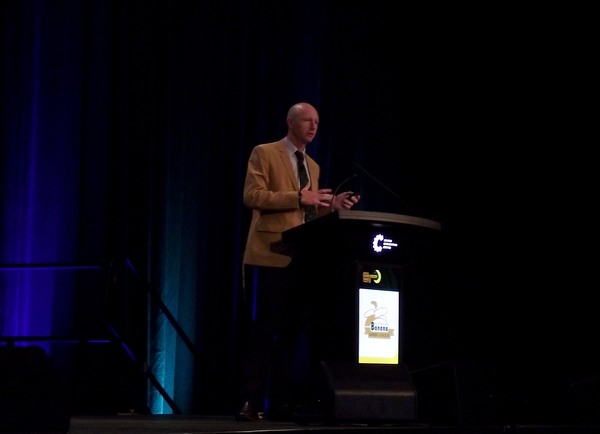A leading agriculture entrepreneur is encouraging the Australian horticulture industry to embrace the concept of sharing and comparing information and ideas in order to improve and grow together.
Jack Milbank, Lexi Tech Pte Ltd told the recent Australian Banana Industry Congress that the industry has evolved over time, with so much competition and a "closed gates" policy, but there needs to be a fundamental shift in mindset.
"I see collaboration happen all the time in the beer industry, the beef industry and the ag-tech sector," he said. "We are combining capability across technology platforms. Yet in horticulture, we’d like to think that we are evolving and innovating, and caring and sharing, but there is still a silent approach to the adoption of new technology and communicating that to the market. Working out where you can complement each other is way easier than outcompeting each other."

Lexi Tech was incorporated in 2020 as a partnership between Pioneer Ecosciences (Japan) and Novum Lifesciences (Australia). It launched AgPro Technology as an independent global Ag-Tech platform offering services to laboratories, growers, producers and agronomists across the world. The company operates with staff in Australia, Japan, the USA and Singapore, with additional major projects in South Africa, Zimbabwe, Indonesia, Uzbekistan and Chile.
Mr Milbank says the knowledge built through one area of agriculture can easily be applied to another, for example, GPS-based ear tags for livestock to monitor their movements can be also used for horticulture farmers to monitor the movements and improve productivity.
"We have an activity tracker, so every 20 minutes we understand where that animal is; we have calibrated it to show a level of activity," he said. "So, while this can be used on a bull in a paddock, it can also be used for a picker in a banana plantation. We obviously won't be ear-tagging pickers, but the technology of putting a tag in a bucket (or banana bunch) and understanding the movement and creating zonal heat maps. So, we can see a trend line if there's overworking or underworking over a one day, seven day or 30-day period. There is significant intelligence that can be extracted from this information. We are learning off of the livestock module and that can be applied to horticulture, and we will learn from horticulture and apply it to ag-tech."

He added that the information can be gathered and used for traceability and transparency purposes, as consumers are wanting more information about where their produce is coming from. He says the existing marketing messaging is becoming one dimensional, and while it still uses great slogans and advertisements to attract consumer attention, people now want to know everything they can about the fruit or vegetable.
"Data enables engagement; whether that is sharing data through soil test results, or flavour profile," Mr Milbank said. "They want to understand the soil health, the metabolites, the nutrient density and also the environmental impact. There are layers and layers of interrogation that consumers put on producers these days, which is incredible. But you either see it as a negative or an opportunity to build on, as people want information, so how do we give it to them. With that curiosity, consumers go down rabbit holes and want to learn more, so that transparency breeds trust. The greater the depth and accessibility to that data, remembering that it has to be relevant to them and that banana and has to be verifiable and accurate. When you have trust, that trust builds loyalty. Loyalty then drives sustainability, because people are with you and want to see you continue to be sustainably developing, and that allows innovation to happen."
